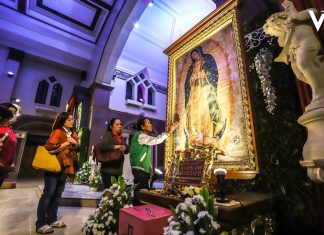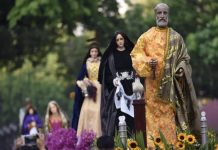 AFTER the silver-medal finish of Hidilyn Diaz in weightlifting in the Rio Olympics, another Diaz has made the nation proud: filmmaker Lav Diaz. His movie, work “Ang Babaeng Humayo,” has won the Golden Lion, the grand prix, in the 73rd Venice International Film Festival, the world’s oldest and along with that Cannes’ and Berlin’s, the most prestigious film festival in the world.
AFTER the silver-medal finish of Hidilyn Diaz in weightlifting in the Rio Olympics, another Diaz has made the nation proud: filmmaker Lav Diaz. His movie, work “Ang Babaeng Humayo,” has won the Golden Lion, the grand prix, in the 73rd Venice International Film Festival, the world’s oldest and along with that Cannes’ and Berlin’s, the most prestigious film festival in the world.
But like Hidilyn who made it to the Olympic finals despite dwindling state support, Lav made it to Venice with hardly any support from government.
Lav Diaz had sought support of the Senate and the Quezon City government so his team could attend the awarding ceremonies, but his request was ignored. He was promised a grant from the Film Development Council of the Philippines but it was reduced to half and he even had to follow reimbursement processes. Instead, it was a travel agency which flew his team to Venice on credit.
It is almost impossible to protect the arts from the self-aggrandizing leanings of Philippine politics. But they deserve the same attention as, say, kickback-prone public works or state welfare assistance to the poor.
But artists and cultural workers continue to receive the bad rap from government. Section 66 of the General Appropriations Act has practically made into a law a stupid memorandum of agreement among the Department of Budget and Management, Commission on Audit, and Department of Social Welfare and Development that requires all government grantees to obtain accreditation from the DSWD. Ostensibly made to avoid a repeat of the Napoles scam—in which lawmakers’ pork barrel were channeled to ghost NGO’s contracted by the lawmakers themselves—the MOA merely passes the onus of the blame for state corruption to the people who have paid their taxes so that government can have welfare and assistance and grants programs that now cannot be readily tapped by those who need them.
Worse for artists and cultural workers, the NCCA grant applicants are made to comply with the MOA, so that arts and culture foundations have been basically classified as welfare NGO’s such as orphanages and relief organizations.
Typical of a bureaucracy that keeps itself busy with paper work rather than doing its actual job, DSWD has given a grocery list of requirements to applicants of NCCA funding: certificates from the local mayor’s office and barangay chair, business permit issued to a “non-profit” organization, NBI clearance for each board director of the corporation, a list of employees, registration with the Securities and Exchange Commission, sanitation permit and several more–all of which which can cause delay or scrapping of several projects.
It is no wonder it took the DWSD nearly two years to release the assistance to victims of supertyphoon Yolanda in 2013. By the time the government aid was given, a beneficiary had already died and his widow said she would use the P30,000 assistance for her husband’s funeral expenses.
Filipinos have very little appreciation of the arts. They are crazy with beauty contests and “Idol” auditions abroad where Filipinos impress jurors with the way they ape western singers and make TV audiences cry with their sob stories of poverty porn. But they give a blank stare at the classical arts and even ridicule the country’s own traditional arts and artists.
Sadly the people get the government that they deserve. If the people are philistines and illiterate, then their government can only be there to cater to their own mediocrity and meretriciousness.














